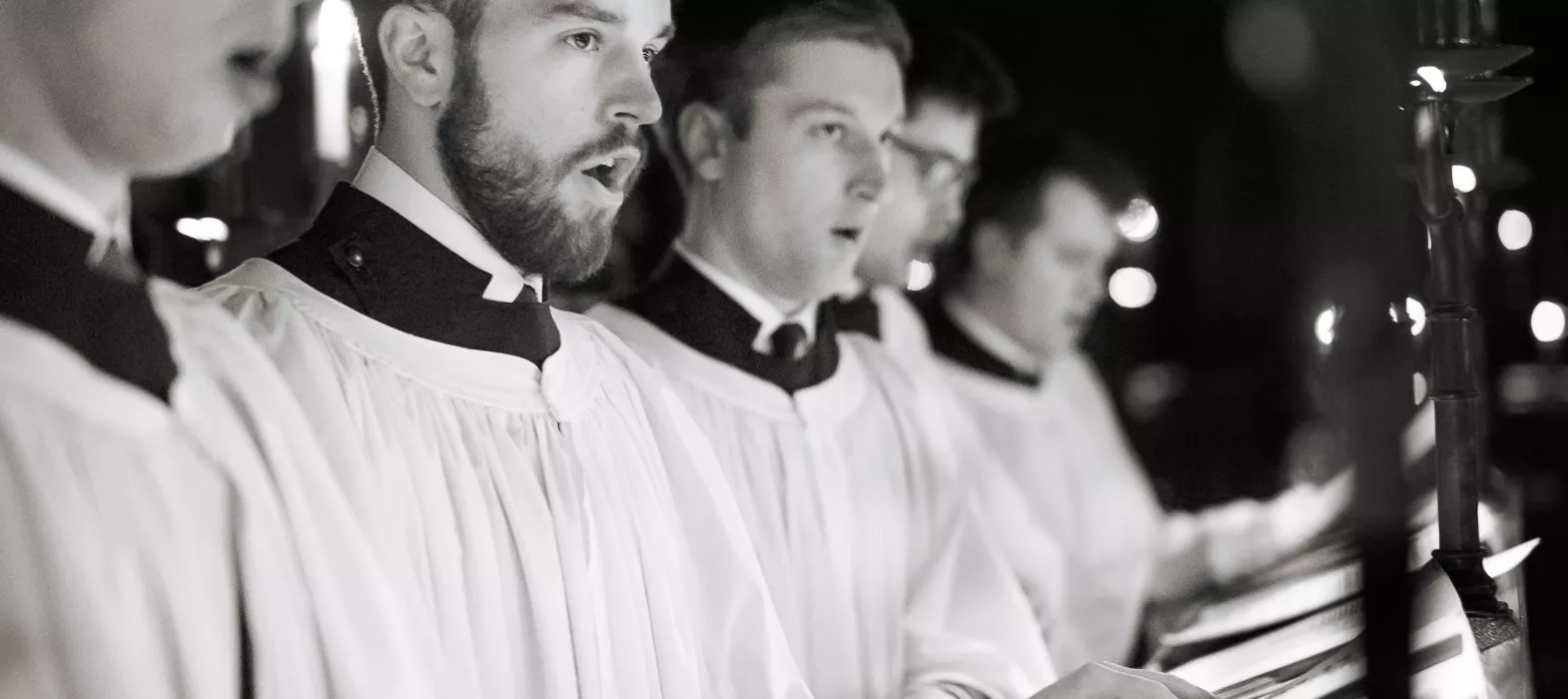The adult voices of New College Choir are provided by the ‘clerks’, a group of fourteen singers: four altos, four tenors and six basses. Of these, eight are undergraduates, admitted to the College on the basis of their ability and potential in both singing and academic study. ‘Academical Clerk’ is the traditional name given to an undergraduate singer in the chapel choir. ‘Lay Clerk’ is the term used to denote the professional singers alongside whom they work. There are six lay clerks.
Membership of New College Choir offers a musical education of remarkable breadth. In regular chapel services the young singer is exposed to a wealth of choral music, and develops several skills – among them, the rewarding discipline of ensemble singing and the management of a busy schedule. Regular performances include a good deal of music by J. S. Bach, in the termly Cantata Vespers and annual performances of the St John Passion and Christmas Oratorio. Beyond this, foreign tours, concerts, and recordings broaden the experience into an exceptional apprenticeship in the world of professional music-making. Clerks receive weekly individual singing lessons from an established teacher, and are encouraged to take their personal vocal development seriously. Occasional masterclasses supplement the individual lessons. New College plays host to a lively series of chamber concerts, where young singers may make their first forays into the world of solo performance. In addition, New Chamber Opera (based in New College and run by Michael Burden, Fellow in Music) offers opportunities for singers to participate in a variety of operatic ventures. The opportunities for vocal and musical development available at New College place it in the forefront of educational programmes for young singers.
The clerks’ commitment to chapel services takes the form of six evening services a week during the University term. These run for eight weeks. There is no Sunday morning duty. External projects normally take place outside University term, and occupy several weeks during the year.
Applying
Becoming an academical clerk involves making a dual application to Oxford University (a choral and a UCAS form). The details of how to apply are given on the Faculty of Music’s Choral and Organ Award pages.
The deadline for receiving applications is normally 1st September, twelve months before the desired year of entry (it is also possible to apply for deferred entry).
Students thinking of making an application are encouraged to attend the Choral and Organ Open Day, usually held in late April, which offers several workshop opportunities. In addition, prospective candidates may contact the Director of Music to discuss their application, and to arrange preliminary interviews/auditions.
Academical clerks receive a bursary of £600 per annum for their work in the chapel. The College meets the cost of weekly singing lessons. In addition, academical clerks receive fees for their work in the Choir’s external activities, its concerts, tours and recordings.
Where are they now?
Previous academical clerks of New College represent a whole range of professional activity (including IT, medicine, law and commerce), but many of them are involved in the singing profession, where their training and experience at New College has placed them in an excellent position to pursue their musical careers. These include Rufus Müller, Robert Hollingworth, Toby Spence, Daniel Norman, Nick Pritchard, Guy Cutting and Alexander Chance (not forgetting the late James Bowman). Of the excellent singers who have entered other professions, none has given up practising their art, often within the domain of semi-professional work.
More information about Oxford choral awards in general may be had from the Music Faculty.

